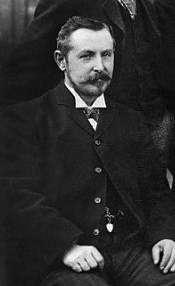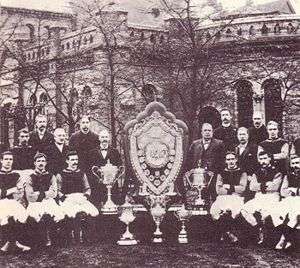George Ramsay
 | |||
| Personal information | |||
|---|---|---|---|
| Full name | George Burrell Ramsay | ||
| Date of birth | March 1, 1855 | ||
| Place of birth | Glasgow, Scotland | ||
| Date of death | October 7, 1935 (aged 80) | ||
| Place of death | Llandrindod Wells, Wales | ||
| Senior career* | |||
| Years | Team | Apps | (Gls) |
| 1874–1882 | Aston Villa | ? | (?) |
| Teams managed | |||
| 1884–1926 | Aston Villa | ||
|
* Senior club appearances and goals counted for the domestic league only. | |||
George Burrell Ramsay (1 March 1855 in Glasgow, Scotland – 7 October 1935[1] in Llandrindod Wells) was secretary and manager of Aston Villa Football Club in the most successful period of their history. His record of six League Championships is second only to Sir Alex Ferguson, and his record of six FA Cup victories stood for 95 years before being equalled by Arsenal manager Arsène Wenger in 2015 with a win over Aston Villa.
Playing career
Ramsay came to join Aston Villa almost by accident. Walking past a Villa players' practice match in Aston Park in 1876, he was asked to make up the numbers. Impressed by his skills, the Villa players invited to join the club, and he soon became captain. Ramsay later described the newly formed club's approach to the game as 'a dash at the man and a big kick at the ball'. He also took charge of training which saw dramatic improvement that showed in the results, introducing what was known as the "passing game". This had become the main style of play in Scotland whereas in England most teams relied on what was known as the "dribbling game".[2]
In addition to the introduction of a radical change in playing style, Ramsay, along with John Linsay discovered the Wellington Road ground at Perry Barr in 1876, which meant the club was able to charge admission for the first time. He was also responsible for the recruitment of Villa legend Archie Hunter. Hunter later recounted the story in his 1890 memoir Triumphs of the Football Field.
| “ | Aston Villa to me as a club that had come rapidly to the fore and asked me to become a member of it. I hesitated for some time, but at last my friend told me that a "brother Scot," Mr. George Ramsay, was the Villa captain and that decided me. Mr. Ramsay was a Glasgow man and had exerted himself very considerably to bring the Villa team into the front rank. | ” | |
| — Archie Hunter, Triumphs of the Football Field | |||
Villa played at Perry Barr until 1897 when the club moved to the Aston Lower Grounds, next to Aston Hall, which later became known as Villa Park. Club folklore has it that Ramsay was the first man to kick a ball at Villa Park.

Villa gradually improved under his guidance which culminated in Villa winning their first trophy, The Birmingham Senior Cup, in 1880, with Ramsay as captain.
Administrative career
Ramsay retired from playing in June 1882, but remained at the club as Secretary from 1884–1926. This position pre-dates the modern role of a football manager, which meant that Ramsay was responsible for the team. His duties not only involved looking after the players but also included controlling recruitment and transfers, supported by a specialist trainer. Although the team was selected by the Committee each week, which consisted of such figures as William McGregor and Fred Rinder. He held this position for a remarkable 42 years, in which time Villa won the Football League and FA Cup 6 times each, establishing themselves as the premier football club in England.
In 1926, at the age of 71, Ramsay retired as Secretary and became honorary advisor and a vice-president of the Club. His replacement W. J. Smith was unable to continue Ramsay's success, although the club did finish runners-up in the league twice under his guidance. In 1934 Smith stood down and the club decided to appoint its first manager, Jimmy McMullan. The following year Ramsay died at the age of 80. Within a year of his death the Midlands giants were relegated, an unthinkable notion in the Ramsay era.
In all Ramsay's association with the football club lasted 59 years, a time which will always be known as Aston Villa's 'Golden Age'. Ramsay was laid to rest at St. Mary's Church, Handsworth, his gravestone reads "Founder of Aston Villa".
Personal life
The Glaswegian arrived in Birmingham around 1871 to work as a clerk in a brass foundry, a position he held until he was appointed Villa's Secretary in 1884. He married Fanny Elizabeth Warwick, a native of Aston, in 1893. They had two sons and one daughter.
Honours
- Aston Villa
- First Division (6): 1893–94, 1895–96, 1896–97, 1898–99, 1899–1900, 1909–10
- FA Cup (6): 1886–87, 1894–95, 1896–97, 1904–05, 1912–13, 1919–20